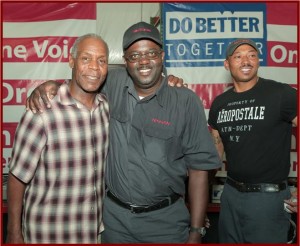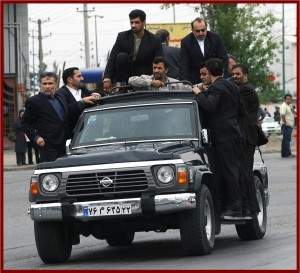
“When workers at Nissan began to organize a union, Nissan responded with implied threats that they would leave Mississippi if workers unionized.”
On the opening morning of the press previews at the North American International Auto Show, a pressure group called the Mississippi Alliance for Fairness at Nissan – MAFFAN – spoke out in Detroit against what it says is unfair labor practices at Nissan’s non-unionized plant in Canton.
The organization representing clergy, elected officials, civil rights activists and students was joined by actor Danny Glover at a press conference that highlighted what MAFFAN claims is “beneath the shine” of Nissan.
“When workers at Nissan began to organize a union, Nissan responded with implied threats that they would leave Mississippi if workers unionized,” said Reverend R. Isiac Jackson, Jr., president of the General Missionary Baptist State Convention of Mississippi and chair MAFFAN.
MAFFAN members asked the public to look further, beneath the shine, to understand the issues in Mississippi and directed them to the www.beneaththeshine.org website to learn about the unfair treatment workers receive in the Nissan plant in Canton, Miss. The website includes a color graphic of a Nissan vehicle, visuals of the car’s construction and a description of how various workers in Canton were treated by Nissan while they built each piece of the vehicle.
“While we welcome the presence of foreign-owned companies like Nissan in Mississippi, we will not tolerate a company treating Mississippians as second class citizens. The Mississippi Alliance for Fairness at Nissan will carry the message in Mississippi, in Detroit and everywhere insisting that Nissan allow a fair process that allows workers to freely decide on unionization,” said Jackson.
Since it was established in 2003, the Nissan Canton facility has become a cornerstone of Nissan’s North American manufacturing operations. Over the past decade, Nissan Canton has grown from building one model to seven, including the Altima sedan, the Armada full-size SUV, the Xterra mid-size SUV, the Titan and Frontier pickup trucks and NV commercial and passenger vans. Beginning in 2014, the Murano will be the eighth vehicle built in Canton and will require several hundred employees for production.
The United Auto Workers Union, reeling from Michigan’s return to a right to work state this year after a “reversal” on the issue by Republican Governor Rick Snyder during a lame duck session, agreed.
In response to an AutoInformed query, the union, which has for decades failed to organize even one of numerous so-called transplants opened in the U.S. by offshore brands in non-union states, released the following statement:
“The UAW is glad to have a partner organization that is standing up for Nissan workers and fighting for a process that ensures a fair election process for workers in Canton to decide for themselves whether they want to be represented by a union,” said UAW President Bob King.
“Workers have had to endure months of meetings during work time where they only hear the employer’s anti-union views. Nissan holds these ‘captive audience’ meetings, in plant-wide meetings, small-group meetings and one-on-one meetings. At these meetings, company management tries to scare workers about unionization, interrogates them about their support for the union and tries to convince them not to support a union.
“We agree with MAFFAN that fear and intimidation should not be part of the equation when workers are deciding whether they want to be represented by a union. Workers should be able to hear equally from both sides and make a decision for themselves. It’s as simple as that,” King concluded. (See http://dobetternissan.org/)
The latest charges follow Nissan’s involvement in a controversy regarding doing business in Iran, contravening U.S. foreign policy and supporting terrorism. The U.S. government is attempting to stop the continuing development of nuclear weapons in Iran, an effort that has apparently so far failed in spite of boycotts and a ban on oil imports from Iran to the European Union, among other sanctions. The U.S. is also against Iran’s sponsorship of terrorism, and Iran’s human rights record. (Read AutoInformed on Maserati, Lamborghini End Business Activities in Iran)
European and Japanese automakers makers including Renault, Nissan, Peugeot, Volvo Group, Mazda, Isuzu and others continue to carry out extensive business and manufacturing agreements with Iranian government fronts or affiliates, such as IKCO, Saipa Group and Bahman Group.
In the view of critics, this is an example of the hypocritically bad behavior of global corporations supporting terrorism and repression abroad in the pursuit of profits against the policies of their home governments, whose democratic laws protect them and provide for the well being their stockholders and their highly paid executives.
Nissan’s image problem is compounded by the fact that it accepted U.S. taxpayer subsidized loans via a $1.4 billion loan from the U.S. Department of Energy t build a battery plant in Tennessee. At the time, this looked to be the fastest way for the Obama Administration to get Republican Senator Corker of Tennessee to drop his opposition to the bailouts of GM and Chrysler.
Nissan says it has no direct investments in Iran. “The limited-scale business relationship we do have with local manufacturer Pars Khodro complies with Japanese Foreign Exchange and Foreign Trade laws (METI) as well as the applicable Export Control Regulations (including the United States Export Control Regulations,” Dave Reuter of Nissan in the U.S. told AutoInformed.
The auto industry represents 20% of Iran’s GDP that is dominated by the Islamic Revolutionary Guard Corps. UANI – a pressure group headed by a former U.S. Ambassador, has developed model legislation, The DRIVE Act, to force auto manufacturers to choose between the interests of American foreign policy and the Iranian regime. The DRIVE Act requires automakers to certify they are not engaged in any business in Iran, or in the implementation of any agreement with Iranian entities in order to be eligible for U.S. government contracts or financial assistance.



We should not allow Temps in our factories, yet we have them in our location here in Rancho Cucamonga, Cal, and to top it off my U A W local condones it!